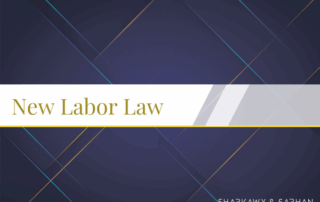1st of May, 2014
Egypt’s Administrative Court Suspends Reviewing Privatization Cases
Keywords: Infrastructure & Projects, Commercial
Following President Adly Mansour’s approval of the law number 32 of 2014 restricting the right to bring annulment actions against contracts concluded with the government (the “Law”), the Administrative Court decided to suspend all the pending privatization cases to which the Law applies, Alborsa news reported.
The Law prevents filing of annulment actions against a contract concluded with the government, or against any procedures or decrees leading up to concluding such contract, by any parties except:
a) One of the parties to the contract, or
b) Third parties who have rights over the assets or funds that are the subject of the contract.
The law makes an exception in cases where the contract was concluded based on a crime of bribery or embezzlement, and a conclusive criminal verdict was issued in that regard. In this case, any third party may bring an annulment action against such contract. The law covers all contracts concluded with the government or any of its entities including government owned companies.
The constitutionality of the Law was challenged in front of the Administrative Court. Such Administrative Court agreed that there are in fact some doubts about the constitutionality of the Law and referred the Law to the Supreme Constitutional Court (the “SCC”) to assess its constitutionality. Until the law’s constitutionality is tested, the Administrative Court will not accept any new privatization cases to which the Law may apply according to Alborsa news. This is because most of the privatization cases are brought by individuals who do not have the authority to challenge the privatization procedure under the Law.
The Law prevents filing of annulment actions against a contract concluded with the government, or against any procedures or decrees leading up to concluding such contract, by any parties except:
a) One of the parties to the contract, or
b) Third parties who have rights over the assets or funds that are the subject of the contract.
The law makes an exception in cases where the contract was concluded based on a crime of bribery or embezzlement, and a conclusive criminal verdict was issued in that regard. In this case, any third party may bring an annulment action against such contract. The law covers all contracts concluded with the government or any of its entities including government owned companies.
The constitutionality of the Law was challenged in front of the Administrative Court. Such Administrative Court agreed that there are in fact some doubts about the constitutionality of the Law and referred the Law to the Supreme Constitutional Court (the “SCC”) to assess its constitutionality. Until the law’s constitutionality is tested, the Administrative Court will not accept any new privatization cases to which the Law may apply according to Alborsa news. This is because most of the privatization cases are brought by individuals who do not have the authority to challenge the privatization procedure under the Law.

Egypt’s Administrative Court Suspends Reviewing Privatization Cases
1 May, 2014
Keywords: Infrastructure & Projects, Commercial
Following President Adly Mansour’s approval of the law number 32 of 2014 restricting the right to bring annulment actions against contracts concluded with the government (the “Law”), the Administrative Court decided to suspend all the pending privatization cases to which the Law applies, Alborsa news reported.
The Law prevents filing of annulment actions against a contract concluded with the government, or against any procedures or decrees leading up to concluding such contract, by any parties except:
a) One of the parties to the contract, or
b) Third parties who have rights over the assets or funds that are the subject of the contract.
The law makes an exception in cases where the contract was concluded based on a crime of bribery or embezzlement, and a conclusive criminal verdict was issued in that regard. In this case, any third party may bring an annulment action against such contract. The law covers all contracts concluded with the government or any of its entities including government owned companies.
The constitutionality of the Law was challenged in front of the Administrative Court. Such Administrative Court agreed that there are in fact some doubts about the constitutionality of the Law and referred the Law to the Supreme Constitutional Court (the “SCC”) to assess its constitutionality. Until the law’s constitutionality is tested, the Administrative Court will not accept any new privatization cases to which the Law may apply according to Alborsa news. This is because most of the privatization cases are brought by individuals who do not have the authority to challenge the privatization procedure under the Law.
The Law prevents filing of annulment actions against a contract concluded with the government, or against any procedures or decrees leading up to concluding such contract, by any parties except:
a) One of the parties to the contract, or
b) Third parties who have rights over the assets or funds that are the subject of the contract.
The law makes an exception in cases where the contract was concluded based on a crime of bribery or embezzlement, and a conclusive criminal verdict was issued in that regard. In this case, any third party may bring an annulment action against such contract. The law covers all contracts concluded with the government or any of its entities including government owned companies.
The constitutionality of the Law was challenged in front of the Administrative Court. Such Administrative Court agreed that there are in fact some doubts about the constitutionality of the Law and referred the Law to the Supreme Constitutional Court (the “SCC”) to assess its constitutionality. Until the law’s constitutionality is tested, the Administrative Court will not accept any new privatization cases to which the Law may apply according to Alborsa news. This is because most of the privatization cases are brought by individuals who do not have the authority to challenge the privatization procedure under the Law.
Key Contacts
Insights
Disclaimer
The information included in this publication/client alert is not legal advice or any other advice. Publications and client alerts on this site are current as of their date of publication and do not necessarily reflect the present law or regulations. Please feel free to contact us should you need any legal advice related to the publication/client alert. Sharkawy & Sarhan (the “Firm”) will not be held liable for any compensatory, special, direct, incidental, indirect, or consequential damages, exemplary damages or any damages whatsoever arising out of or in connection with the use of the data, information or material included in this publication/client alert. This publication/client alert may contain links to third-party websites that are not controlled by the Firm. These third-party links are made available to you as a convenience and you agree to use these links at your own risk. Please be aware that the Firm is not responsible for the content or services offered by and of third-party websites, links as included in the Newsletter nor are we responsible for the privacy policy or practices of third-party websites links included therein.
Authorization of Use
The data, information, and material included in this publication/client alert are solely owned by the Firm. All rights related are reserved under the laws of the Arab Republic of Egypt. No part of this publication/client alert can be redistributed, copied, or reproduced without the prior written consent of the Firm.



